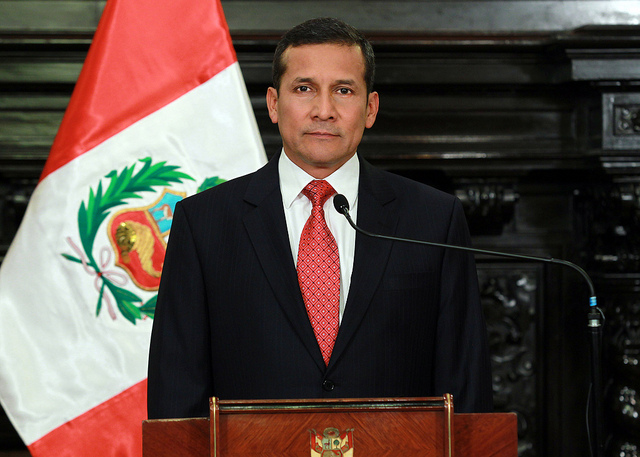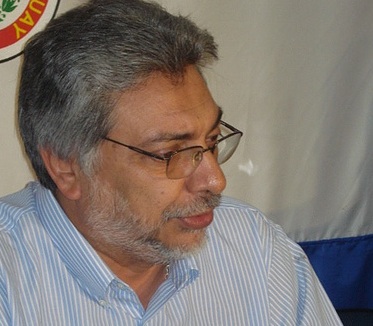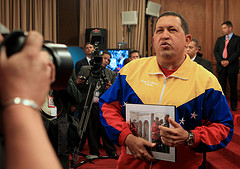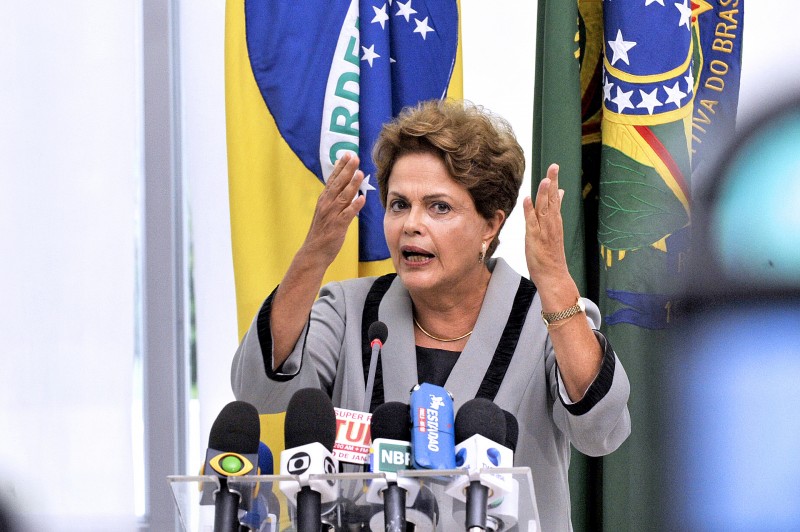
Latin America: Week in Review, Puerto Rico
Obama Visits Puerto Rico; Hopes To Gain Latino Votes For 2012 Election
June 15, 2011 By Staff
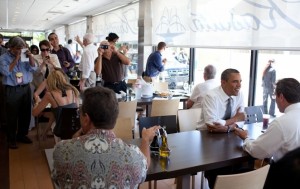
President Barack Obama talks with Puerto Rican Senator Alejandro García Padilla during a lunch stop (White House photo).
Today in Latin America
Top Story — Barack Obama became the first sitting U.S. president since since John F. Kennedy to visit Puerto Rico on Tuesday, fulfilling a promise he made back on the campaign trail in 2008.
Speaking during a welcome event at the Luis Muñoz Marin International Airport in San Juan, Obama highlighted the contributions that Puerto Ricans had made to the United States and promised to advance the debate about the island’s political status.
“In March, a report from our presidential task force on Puerto Rican status provided a meaningful way forward on this question so that the residents of the island can determine their own future,” Obama said during his speech. ” And when the people of Puerto Rico make a clear decision, my administration will stand by you.”
The president also addressed issues of education and healthcare, saying that these problems existed when Kennedy visited the island in 1961.
“We’ve been trying to make sure that every family on the island can find work and make a living and provide for their children. That’s why our economic plan and our health care reform included help for Puerto Rico,” he said, according to a White House transcript of his remarks. “We’re giving Puerto Ricans the tools they need to build their own economic futures.”
After his speech, Obama toured the streets of Old San Juan and stopped for a sandwich at a local restaurant.
While White House officials downplayed the political nature of the trip, Obama’s visit can be seen as a way to win over some of the four million Puerto Ricans who live on the U.S. mainland in the run-up to next year’s presidential campaign. Obama drew strong backing from Latino voters during his 2008 campaign, with 67 percent according to the Pew Hispanic Center, but support has wavered since due to his administration’s lack of action toward comprehensive immigration reform.
Puerto Rico is home to nearly four million U.S. citizens, but its residents are unable to vote in the general presidential election — only in the primaries.
Obama was scheduled to hold one campaign fundraiser during his visit and meet with Puerto Rico’s Republican Gov. Luis Fortuño.
“They were the swing voters in ’04, ’06, ’08 and they will do it again,” Fortuño said of the Puerto Rican vote. “They will look at the candidates and see what commitment they got, not just to the Puerto Rican community but to also the Hispanic community.”
One place where the Puerto Rican vote will play a decisive roll in next year’s election is Florida. The state is home to more than 840,000 Puerto Ricans and is not as Democratic as the Northeast, another Puerto Rican stronghold.
“This is all about Florida where the Puerto Rican vote is not nearly as Democratic as it is in the Northeast. It’s turned into a swing vote,” University of Virginia’s Larry Sabato told Fox News. “Puerto Ricans living in Florida… could very easily tip that state one way or the other in 2012, that’s what this trip is really about.”
For a minute-by-minute recap of the Obama visit, see Puerto Rican daily El Nuevo Día.
Just Published at the Latin America News Dispatch
- The Global Commission on Drug Policy issued a report earlier this month criticizing the U.S.-led drug war. But will its recommendations change the United States’ approach toward drug trafficking? Molly O’Toole reports from New York City.
Headlines from the Western Hemisphere
North America
- After being released from custody early Tuesday, Baja California state prosecutors immediately rearrested Jorge Hank Rhon in connection with a murder investigation.
- Three Democratic U.S. senators called for tougher gun laws and regulations after releasing a report that showed a large number of weapons used in Mexico’s drug war come from the U.S.
- Police officials from Houston and Dallas told state legislators that a proposed bill meant to prevent undocumented immigrants from entering the U.S. could end up hampering public safety.
Caribbean
- A previously unpublished diary by the Argentine-born revolutionary Ernesto Che Guevara has been unveiled in Cuba.
- Production of Cuban cigars and tobacco leaf are on the rise after falling on hard times due to smoking bans and the international financial crisis, according to local reports.
- The head of the United Nations Educational, Scientific and Cultural Organization (UNESCO) has welcomed the $360 million fund launched by Haiti’s new President to ensure the most disadvantaged children in the country can go to school.
Central America
- Federal officials in Guatemala found a video of the decapitation of a prosecutor in the cell phone of an alleged Zetas cartel member.
- The International Press Institute (IPI) condemned Tuesday the murder of a journalist in western El Salvador.
- The children of Nicaraguan President President Daniel Ortega have followed in their family members’ footsteps and started a television network.
- Standard & Poor revised its credit rating for Honduras Tuesday, moving the Central American nation from stable to positive.
- Costa Rican authorities Monday inaugurated an incinerator with the ability to destroy up to 300 kilograms of cocaine per hour.
- National Zoo scientists in Washington D.C. said Monday that a deadly amphibian disease has been discovered in Panama.
Andes
- Venezuelan authorities Tuesday charged an employee of state-run electricity company Corpoelec with sabotage, saying the act led to a major electricity failure across several states in May.
- Colombian lawmakers passed legislation they hope will open the floodgates of trade with China, where the government plans two high-level trade missions over the next three months, as a long-delayed U.S. trade deal with the South American nation stalls in Congress.
- Colombia’s leftist rebels clashed with security forces at a checkpoint in the Southwest and other guerrillas briefly kidnapped a security contractor for an oil company in the East, army sources said on Tuesday.
- Peruvian President-elect Ollanta Humala has gone on record ruling out an early push for membership of the Mercosur trade bloc for his country’s emerging economy but leaving the door open for a political tie with the group.
Southern Cone
- Another land activist in Brazil’s Amazon region has been shot dead, which brings the number of activists killed over the past month to at least five.
- The U.S. and Argentina settled a dispute over that South American nations’s February seizure of military equipment brought in by an American police-training team.
- The volcanic ash cloud from Chile’s Puyehue volcano continues to disrupt flights and travel plans, including those of UN Secretary General Ban Ki-moon.
Image: Pete Souza @ Whitehouse.gov.
